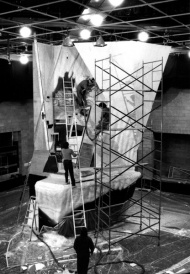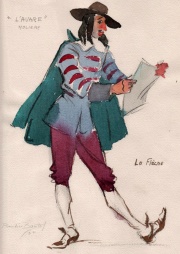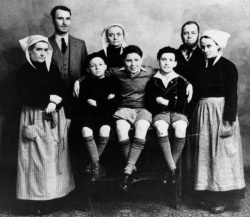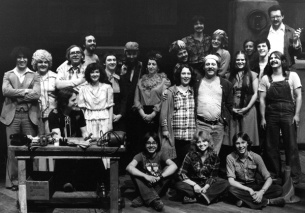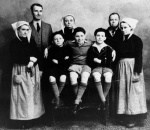The Cercle Molière: for the Love of Theatre in French
par Forbes, Lorraine and Gaboury-Diallo, Lise
Every year without fail, since 1925, the Cercle Molière [Molière Circle] has presented theatre in French in Winnipeg, Manitoba. The Circle is recognized as Canada's oldest theatre company of any language and represents one of the finest French culture treasures that has roots in Western Canada. Originally operated by passionate amateur theatre lovers, the Circle is now a professional company. It offers a program for adults and another for younger audiences, as well as providing training sessions in the dramatic arts. The Circle is a major monument to local heritage and is a key player on Manitoba's French-language arts and culture scene. It has always been a rallying point for the energies of the Franco-Manitoban community, which has often helped it overcome the many obstacles that it has had to face.
Article disponible en français : Le Cercle Molière : pour l'amour du théâtre en français
The Longevity and Continuity of the Cercle Molière
Founded in St. Boniface in 1925, the Cercle Molière Theatre Company has had, from its earliest beginnings, the mission of promoting the performing arts in the French language. Originally, the Circle produced one or two plays per year, whereas it now presents as many as five per season, including works by guest companies. These plays are taken from the Canadian, American, and European repertoires. The Circle also participates in local productions and offers regional tours. In addition, over the last several years it has organised a series of impromptu readings that take place alongside the regular season. With this activity, the Circle has taken on another role: that of a forum for the dramatic arts, especially those of an experimental nature. Upon occasion, even contemporary Franco-Manitoban works are the topic of the day. In this context, new works are presented with a minimal amount of staging. Some of these works are subsequently chosen for full-blown presentations during future seasons of the company.
More recently, some educational activities have been added to the Circle's mission. For, since 1985, it has been in charge of the Théâtre du Grand Cercle, whose mission is to promote theatre among children and young adults. It also supervises the Festival Théâtre Jeunesse [Youth Theatre Festival], founded in 1970. This is an event that attracts over 600 students from French-language high schools and French-immersion institutions. These students perform short one-act plays in French, which are often written by the young people themselves. In addition, in 2003, the Circle established a theatre school, which offers children courses in the dramatic arts. Last but not least, as a founding member of the Association des Compagnies de Théâtre de l'Ouest (ACTO), the Circle collaborates with a number of other local and provincial companies throughout Western Canada.
Since its founding, the Circle has received some of the highest honours awarded by Manitoba, Quebec, Canada and France, for its contribution to the promotion of French language culture. Before 1945, there were very few professional theatre companies in Canada. The most solidly established theatre event in the country was The Dominion Festival.(NOTE 1) Between 1934 and 1974, the Circle won numerous awards at this festival. In 1939, the French government, through its embassy in Canada, awarded several honours, among which the Palmes Académiques presented to Arthur and Pauline Boutal of the Cercle Molière. A short time later, Pauline Boutal was awarded the Mérite de la Culture Française [French Culture Merit Award] in Canada as well as the Order of Canada. In 1958, the recently founded Canada Council for the Arts, which was only in its second year of operation, awarded the Circle its first Canada Council theatre company grant. This financial assistance enabled the company to organise its first inaugural tour outside the province. Since then, the Canada Council for the Arts has offered a number of study scholarships to company members and has honoured several of its actors with the Canada Drama Award. More recently, in 2002, the Circle was awarded a Masque by the Académie Québecoise de Théatre for the best Franco-Canadian production of Poissons by Franco-Manitoban playwright Marc Prescott. In 2006, the Circle also received the Prix du 3-juillet-1608.
The long-standing theatre tradition of the Cercle Molière, whose initiatives have often been highly acclaimed and awarded outstanding prizes, speaks volumes about how much it is cherished by Manitoba's French-speaking community. The response of Franco-Manitobans to appeals launched by the Circle during various crises proves that the community immediately recognised its great heritage value and that they had indeed held the company in long-standing admiration as a form of artistic expression. Manitoban French speakers provided the Circle with financial support when cutbacks in government subsidies threatened its programming, as well as with help for the company to carry out various endeavours, such as the construction of a new permanent theatre. Franco-Manitobans are very proud of their theatre and especially of the role played by the Cercle Molière. This pride has only increased with the years, given that the Circle has always made it a priority to strengthen its linguistic, artistic, and cultural links to the community.
Since 1970, the company has included a number of works by Franco-Manitoban playwrights in its repertory, with Roger Auger, Réal Cenerini, Jean-Pierre Dubé, Claude Dorge, Irène Mahé, and Marc Prescott deserving special mention. This trend emerged in 1973 when the Circle proposed its first all-Canadian season. In 1986, and again in 2000, during the company's 75th anniversary season, the Circle presented two complete Franco-Manitoban programs. Accordingly, the Circle plays a key role in the community due to its tireless efforts to preserve and celebrate the French language and culture, all the while encouraging the participation of the entire community. The Circle bears eloquent witness to the ongoing energetic involvement of Western Canada's French speakers in all areas of the arts.
Birth and Evolution of the Cercle Molière
The first mention of a literature and drama evening in Manitoban history dates back to 1866. Twenty or so theatre companies were already in existence before three theatre lovers from three different localities(NOTE 2) established the Cercle Molière in 1925. An advocacy committee was formed, made up of six members (three French and three English speakers), for the purpose of fostering understanding and reconciliation between the French and English-speaking communities. The first play chosen by the new company, Le Monde où l'on s'ennuie, by Edmond Pailleron, was performed at Winnipeg's prestigious Dominion Theatre. Without a permanent home, but nevertheless always striving for excellence, the Circle performed for many years in some of Winnipeg's finest theatres. The young company brought together French speakers of various origins: Canadian, Belgian, Swiss, and French. Since its earliest beginnings, the Circle has concentrated on training and preparing the next generation of artists, all the while fostering community participation in its productions. For nearly 50 years, the community (individuals, parishes, schools, etc.) have supported the company by offering rehearsal halls, locations for its costume and set-design workshops and storage areas.
The company's productions are ambitious and as a consequence, they have been rewarded with high praise. For example, according to the Winnipeg Free Press, the 1928 North American première of L'Arlésienne (Alphonse Daudet) was a major success. Very early on, in 1929 and 1930, the company set out on tours to other French-speaking population centres in the province. The first out-of-province tour, showcasing Molière's Le Médecin Malgré Lui [Doctor, Inspite of Himself], took the company to Vancouver in 1959. And here is a remarkable fact: the company has had only four artistic directors since its founding. First, there was André Castelein de la Lande (1925 to 1928), followed by Arthur Boutal (1928 to 1941). Then, after the death of Arthur Boutal, his wife Pauline Le Goff Boutal took over as artistic director, holding the position from 1941 to 1968, while continuing to work with the company as the director for individual plays, as well as set designer and actress. In turn, Roland Mahé became artistic director in 1968, after completing theatre studies in Montreal and Strasbourg. As a result of his vivacious energy, the Cercle Molière would become a professional company with the daring to present a wide array of experimental productions, which could hold their own with national-level theatre trends, particularly those of Quebec. Most notably, he would present Bousille et les Justes, by Gratien Gélinas, in 1967 and Les belles-soeurs, by Michel Tremblay, in 1970-just only two years after its controversial première in Montreal.
At the beginning of the 1970s, the Cercle Molière experienced a period of great effervescence. From then on, it was often Canadian plays that would be showcased by the company. In 1969, the Circle also began to offer theatre targeting younger audiences. The Théâtre du Grand Cercle was founded in 1985 and the Festival Théâtre Jeunesse in the following year. This was also the period of the first co-productions, a formula adopted by a number of small companies to maximize their perpetually modest budgets. In 1974, the newly established Franco-Manitoban Cultural Centre (CCFM) offered the Cercle Molière a permanent home: the new 310-seat Salle Pauline-Boutal. The CCFM also provided much needed office, workshop, and storage space. A number of major productions followed, as the company's staff continued to grow. It would eventually reach a total of some 60 actors, designers, and technicians. From 1977 on, various measures for generating income were established. The most notable is the memorable Gala du Homard, a lobster festival that draws over 1,000 participants yearly and helps raise public awareness of the Circle in Winnipeg. The company began to offer season tickets in 1974 and sales have increased ever since, with the subscription level reaching 97% during the 2004-2005 season.
An important transition took place in 1997, when the Circle moved to the Théâtre de la Chapelle, a small, 90-seat hall converted into a dinner theatre. The very high cost of major productions and the fact that the Salle Pauline-Boutal was often rented to other associations and organizations had created constraints that proved difficult to handle. By reason of the move, the company was now able to perform each play on its program for three full weeks instead of only a few performances and, as a result, was now able to schedule additional showings based on demand. Consequently, the company has gradually erased its annual deficit. Although accustomed to major productions, its audience has been won over by the new presentation format of a theatre soiree, which is confirmed by the high number of season ticket holders. This is the reason why a new 125-seat theatre is currently under construction at the Franco-Manitoban Cultural Centre, heralding a promising future for the Cercle Molière. The troupe's popularity within the French-speaking community remains rock solid and it has recently been enriched by the arrival of immigrants from the world over, as well as by a growing number of Francophiles.
Constructing and Showcasing an Identity: the Contribution of the Cercle Molière
Western Canada has long been considered a work in progress, a region where everything is possible. Located far from most of the major population centres, its relative isolation has fostered solidarity and triggered exceptional achievements. Franco-Manitobans belong to a community of modest means, which is spread out between the big city and a string of farming villages around Winnipeg. In French-speaking Manitoba, the love of theatre often served as a source of cultural sustenance during the first half of the 20th century. Afterwards, the community was surpassed in numbers by immigrants arriving in a massive influx from the rest of Canada and from abroad. As a result, the French-Canadians lost their status as a founding people to become only one ethnic group among others in the eyes of the Anglo-Canadian ruling class. Since 1970, Winnipeg has proudly displayed its cosmopolitan side, with its universities, its Folklorama and its numerous cultural events.
Nevertheless, the Cercle Molière lives on, producing high-quality theatre, thanks to the support of a community that has a never-ending need for this form of artistic expression. Movies, radio, television, the Internet, and other types of leisure activities may take up people's free time, but the theatre offers a unique platform for self-expression, shared listening, and community affirmation. As members of the French-speaking community in Manitoba, the company's founders have never abandoned their ideals. Throughout the Circle's long history, from one generation to the next, there has been a remarkable continuity along with a constant renewal, due to the influx of new participants. A great many artists have learned the tricks of the actor's trade on the Cercle Molière's stage before continuing their training in Eastern Canada, in their quest for a career in theatre arts. Others have returned to perform in Winnipeg. The writer Gabrielle Roy, who played one of the sisters in Les soeurs Guédonnec, alongside Élisa Houde, in 1936, is only one of many noteworthy artists marked by time onstage at the Cercle Molière.
Those for whom theatre is not just a simple form of entertainment or a consumer product, but rather a social art, an expression of culture and of community, as well as a forum for exchanging ideas, these special individuals feel very much at home at the Cercle Molière, which, in 2006, was recognized for "its commitment to the cultural life of French-speaking North America."(NOTE 3)
Lorraine
Forbes
Lise Gaboury-Diallo
University
College of Saint Boniface
NOTES
Note 1: Known in French as the Festival national d'art dramatique du Canada.
Note 2: Its founders were: André Castelein de la Lande, of Belgian origin, French teacher, playwright, actor, and theatre director (artistic director); Raymond Bernier, a native of St. Boniface (Manitoba), owner of a music shop and appraiser with the Federal Customs Office (Secretary-Treasurer); and Louis-Philippe Gagnon, born in Rimouski (Quebec), and owner of the Librairie Kérouac Bookstore (President).
Note 3: The Conseil supérieur de la langue française du Québec annually awards the Prix du 3-juillet-1608 to an organization that distinguishes itself in this manner.
BIBLIOGRAPHY
Artibise, Alan F.J., « Winnipeg », L'encyclopédie canadienne en ligne. [En ligne] [Consulted online in French on March 11th, 2007].
Dubé, Jean-Pierre, Passion et création, Le Cercle Molière, 75e anniversaire, Winnipeg, Cahier souvenir publié par le Cercle Molière, 2000, 66 p.
Duguay, Louise, « Pauline Boutal», L'encyclopédie canadienne en ligne. [En ligne] [Consulted online in French on March 11th, 2007].
Gaboury-Diallo, Lise, « Roland Mahé», L'encyclopédie canadienne en ligne. [En ligne] (Consulté le 11 mars 2007).
Gaboury-Diallo, Lise et Laurence Véron, « De l'audace, toujours de l'audace : le théâtre franco-manitobain du Cercle Molière », dans Hélène Beauchamp et Joël Beddows (dir.), Les théâtres professionnels du Canada francophone : entre mémoire et rupture, Ottawa, Le Nordir, 2001, p. 105-134.
Gaboury-Diallo, Lise, « Le Cercle Molière », L'encyclopédie canadienne en ligne. [En ligne] [Consulted online in French on March 11th, 2007].
Gardner, David, « Festival national d'art dramatique du Canada », L'Encyclopédie canadienne en ligne. [En ligne] [Consulted online in French on March 11th, 2007].
Le Cercle Molière : cinquantième anniversaire, Winnipeg, Cahier souvenir publié par le Cercle Molière, 1975, non paginé.
Le Cercle Molière. [En ligne] [Consulted online in French on March 11th, 2007].
Saint-Pierre, Annette, Le rideau se lève au Manitoba, Winnipeg, Les Éditions des Plaines, 1980, 318 p.
Additional DocumentsSome documents require an additional plugin to be consulted
Images
-
 K2 de Patrick Myers
K2 de Patrick Myers
-
 L’Avare de Molière
L’Avare de Molière
-
 L’équipe de V’la Verm
L’équipe de V’la Verm
ette de Roger A... -
 Le spectacle «Poisson
Le spectacle «Poisson
s».


